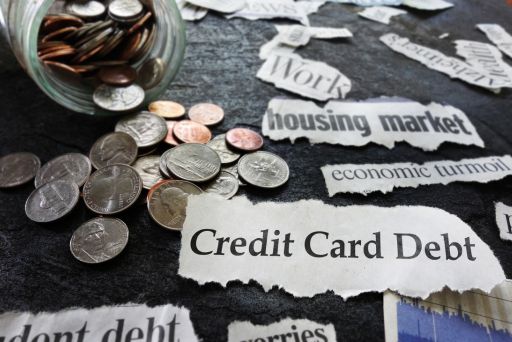
Being an entrepreneur means you’re bound to take risks, even if they’re well calculated and justifiable and when it comes to running or starting a small business taking out loans or racking up debt are usually a large part of that risk. The smartest entrepreneurs we know are those that take the risks and then set up a game plan to make sure the odds fall in their favor. We’re sharing a few easy ways to get debt free quickly.
Have an Emergency Savings Fund
It may seem almost counter-productive to say that the best way to pay off debt is to save money, but we’ve found that it’s one way small business owners make sure they can survive. Setting aside, even a small amount, every month as an emergency fund means that you’ll be prepared to keep your business open and running in case problems arise. This means you’ll still be open so you can bring in an income and it also means that you’ve got cash you can use when an emergency comes up so you won’t have to rob your creditors by cutting down the amount you pay each month or not paying at all.
Always make Minimum Monthly Payments
After the emergency fund, committing to always making minimum monthly payments is the best way to pay down debt. When you’re starting a business plan to operate on the lean side right from the start. By doing so, you’ll be able to guarantee that you can make minimum monthly payments because you’ve played it safe from the beginning. Of course it’s better to pay more than the monthly minimum payment if possible, but always paying the monthly payment – and paying it on time – means you’re making a dent in the debt you’ve already accrued.
Create a budget and remove extraneous items
If you haven’t already created a budget – do it now. Not having a budget may have put you further into debt to begin with, but it’s always better to set things right now than to let them linger on. Having a budget allows you to see where the money is going each month. You may have to adjust your budget after a month or two if you’re just starting out, but having an idea of how much you spend and when is a good start to getting things paid off and knowing what you can afford.
If you’re wanting to pay off debt even faster, take a look at your budget and see where you might be able to cut back. A great place to look first would be in the petty cash and miscellaneous expenses – these are often “extras” that are easy to cut out. Then, take a look and see if you can eliminate extra cost – can you move to a less expensive plan for your phone bill or internet provider? how about cutting back on the amount of overhead you carry? do you have too many employees or too large of a retail space? Looking to cut back in every category makes you hyper-aware of what you have, and conscientious of what you really need. Even if the answer is “no, we can’t cut that” you can watch that area over the next month or two and really be able to see if that’s true.
Prioritize Debt Payments
It’s also known as laddering, stacking, or a debt avalanche, but no matter what you call it – it does the same thing. Prioritizing your debts is something that is just plain smart and incredibly useful in managing both small business and personal finances. To accomplish it, list out all your outstanding debts. Then you’ll be able to see which have the highest amounts and the highest interest rates. Now you’ll decide which debt to attack first – you can pick the one with the highest interest rate, the one with the highest balance or the one that you know you can pay off fairly quickly (this option is great for helping you to feel a quick surge of success which can fuel you to continue paying off debt!). From there the process is simple, you continue to aggressively pay the debt of your choice while paying just the minimum for every other debt you hold. Then when your selected debt is paid off in full, you roll the payments you were making there onto the next debt.
The key to this method is sometimes forgotten – for the debt avalanche to work, you need to make sure you’re covering all your necessary expenses month to month. Putting these on a credit card or not paying them at all, only increases your problem rather than helps solve it.
Increase your Income
When the debts start piling up, it’s easy to focus on what you owe rather than what you earn. Spending some time looking at ways to increase your income is one of the easiest ways to pay down debt especially when it comes to your small business. What market haven’t you tapped into, could you run a sale or promotion to drive sales, is there a product you’re ready to launch that might bring in additional revenue without raising your costs too much? Maybe you need to pick up a second job or an additional revenue stream? Looking for ways to increase your income is a great way to pay down debt – because whatever additional income you generate can be put directly to paying off your debt.
What other ways have you quickly paid down debt? Tell us in the comments.

FAQs: Getting Debt Free as an Entrepreneur
1. Why is having an emergency savings fund important for paying off debt?
An emergency savings fund helps ensure you can keep your business running and handle unexpected expenses without needing to reduce debt payments. It provides a financial cushion that keeps you from missing payments or increasing your debt further.
2. How can always making minimum monthly payments help reduce debt?
Making minimum monthly payments consistently ensures that you are at least covering the interest on your debt, which prevents it from growing. Paying more than the minimum when possible will reduce the principal faster, but maintaining the minimum payment is crucial for steady progress.
3. What should I include in my budget to help pay off debt?
Include all income and expenses, and categorize them to track spending. Look for areas where you can cut back, such as petty cash, miscellaneous expenses, and non-essential services. Adjust your budget as needed to maximize debt payments.
4. What does it mean to prioritize debt payments, and how does it work?
Prioritizing debt payments involves listing all debts and focusing on paying off one at a time, usually starting with the highest interest rate or the smallest balance. This method, known as laddering or stacking, helps reduce overall interest paid and provides a sense of accomplishment as each debt is paid off.
5. How can increasing my income help with debt repayment?
Increasing your income provides additional funds that can be used to pay down debt more quickly. This can be achieved through exploring new markets, running promotions, launching new products, or even taking on a second job. The extra revenue helps accelerate debt reduction without cutting into essential business operations.

